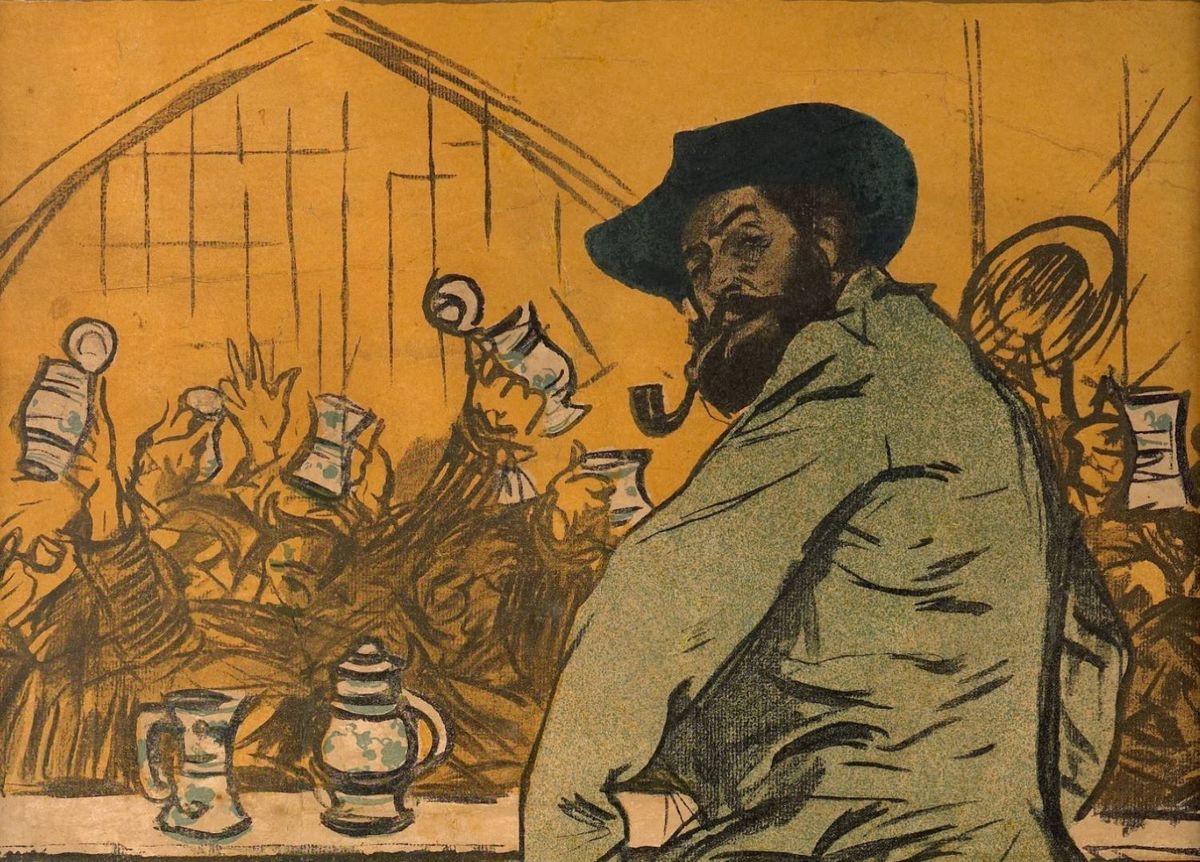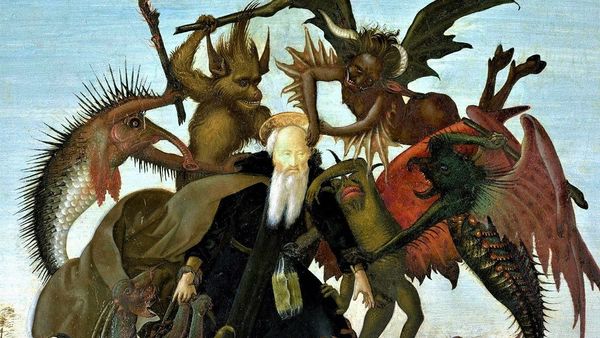If he considers his evil reputation, he will come to perceive his own foul odor so that he will smell rank even to himself. If he goes on then to contemplate his fits of rage, his bad temper, his envy, and his pride, he will suddenly find that he has become bitter to himself.
—Peter Faber, SJ
We tend these days to think of corruption in procedural and bureaucratic terms. Someone uses the authorities of his office to impede those investigating him. Someone places his children in prominent business or political positions in lieu of qualified professionals. Someone pays to have embarrassing news stories buried. Someone hires an army of lawyers to generate baroque and impenetrable financial arrangements to dodge taxes. Whatever impersonal and at times unnavigable obstacles the bureaucratization of finance and governance has generated, it has also inculcated us with the epoch-making expectation of equitable and transparent process, as well as the sense that its circumvention violates the very essence of public morality. And we have a word for that: corruption.
Corruption as a moral category is not purely modern, however. St. Athanasius of Alexandria, for example, made it central to his account of the Incarnation. Athanasius’s sense of corruption was not so bloodless as our own, however. It was literally visceral. We might even say it was gory. Where modern talk of corruption can spark principled outrage, ancient talk of corruption was meant to trigger disgust alongside opprobrium. To invoke the humorous biology of antiquity (and intentionally mix ancient with modern associations), we could say it was meant to set one’s bile in its ascending. Hearers and readers should come away with the impression that moral corruption is not just bad, but also gross.
In On The Incarnation, Athanasius analogizes between the features of human animality and human spirituality.[1] Human beings, like all animals, are subject to physical death and corruption—that is, decomposition. Eventually, all our bodies stop living and begin to decay. Human beings, however, are unique among living creatures insofar as, prior to death, we are possessed of both bodily and spiritual life. Spiritual life is a special gift bestowed by God and it is, on Athanasius’s read, an “impress” of the divine Word in us. What shape does this impress take? In addition to the various physiological and psychological activities we share with other sentient mammals, we are also given to understand, to know, to decide, to take action in the full and moral sense. We have, in brief, an intellect and a will.
This divine-type life we receive in the Word, that we live in and through our knowing and our freedom, because it is first of all God’s life, is not—in principle—a kind of life subject to death or corruption. Except, as the medieval dictum has it, what is received is received in the mode of the receiver. Consequently, we do not have divine, spiritual life the way that God has it. God has and, really, is this divine life in an infinite, perfect, timeless blaze of free and knowing love. We have spiritual life in and through a finite body that moves through time and space. Human spirituality has to develop, to become itself in and through this movement. We come-to-life spiritually by learning what we need to know and by deciding what we are to do. But each sequential opportunity to learn and decide is equally an occasion on which we may fail to learn what God has for us to learn, to fail to choose what God has for us to do.
Thus, we might expect that as in the animal life of humans, so too in our spiritual life: if you cease the activities in which living consists, you die. But at this point in the analogy Athanasius puts a (perhaps surprising) emphasis on corruption. When animal living fails, death precedes decomposition. But when spiritual living fails, the inverse holds: spiritual corruption takes hold and heads towards death. Indeed, the traverse from spiritual corruption to spiritual death is so ineluctable that Athanasius calls it a “law.” Here the modern reader is tempted to read “law” in a juridical sense, but we might do better comparing it to the scientist’s “law” of nature.
This analogy, though plenty evocative, is not only rhetorical. It is also ontological. It is an analogy that holds between orders of being, material and immaterial; so too then does this point of dis-analogy. Living bodies die and then corrupt; spiritual life begins to decay and only then dies. This poses an immediate problem.[2] God decided to give this gift of divine life to human creatures and it is scandalous that God’s will—namely, that we should have divine life with God—should come to nothing. But behind this volitional problem, there is an underlying conceptual and metaphysical problem: how can this divine, spiritual, immaterial kind of life be subject to corruption at all? God’s manifest intention, according to Athanasius, is that the receipt of spiritual life should inaugurate a creaturely participation in the divine life for human beings. The culmination of that relationship should, in principle, involve some kind of integration into the eternal, undying life of the triune God. Spiritual life is meant to be, loosely speaking, integration into eternal life.
It is possible, I think, that a creature’s spiritual death might be conceived in terms of annihilation. What God creates God may cease to hold in being. But spiritual corruption? If spiritual being is properly and in the first instance God’s being, is not spirit the kind of thing that is intrinsically insusceptible to decay, no matter whether it is finite or infinite? If we only consider spiritual life as a kind of substance, a kind of spirit-stuff instead of matter-stuff, this problem is likely insuperable. But even Aristotle (purportedly the substance metaphysician par excellence) identifies the soul not as a substance—that would be the actually living body itself—but as a principle of life. And he infers the presence of this principle from the effects that depend on it, i.e. those activities in which life consists. The presence of a body but the absence of those activities indicates a loss of life and, soon enough, the material corruption of the substance that was. This is, before any metaphysical analysis can begin, an empirical matter.
But when it comes to spiritual corruption, it turns out the matter is empirical as well: even if we do not know exactly how, we know that human spiritual life can be subject to corruption because we observe it as a matter of fact. Like we may observe a corpse progressively decomposing and disintegrating, so we witness an analogous de-composition and dis-integration in the intellectual and volitional activity of others and even ourselves. If wisdom grasps the intrinsic order in knowledge, then a scattered, distracted, disorderly mind is evidence of spiritual corruption. A heart that is similarly scattered in its affections, distracted in its deliberations, and disordered in its priorities provides evidence of the same.
But if all of that seems too abstract and general, we might have recourse to our preferred metaphors for the obtuse and irresponsible. They need to “get it together.” Their lives are “falling apart.” They are a “mess.” All speak to the decomposition that moral and intellectual failures effect in our lives. Nor are we obtuse to the progressive nature of spiritual decay. Perhaps you have acknowledged, in reference to a ne’er-do-well in your life, the sad fact that if something does not change, they will end up dead or in jail. If someone fails badly enough in the moral arena and is brought to face the consequences, we may suspect “their life is over.” Such is Athanasius’s law: spiritual corruption heads towards spiritual death.
I want to reiterate that this law, though it is (like every structural feature of the universe) the product of divine legislation and though the spiritual corruption and death which it describes are in fact consequences of intellectual and moral failure, it is important not to mistake this law for the arbitrary policy of an autocrat or the extrinsic punishment imposed by an exasperated parent. No, the whole matter is more like a law of physics than a law of man. If one fails to understand what it is needful to understand or fails to decide upon a morally obligatory course of action, then like a dropped plate shatters on the floor, corruption follows of necessity.
The intellectual subject, the moral agent who would have learned, would have done these things now lacks that knowledge, that experience, that habit which would have prepared him or her for subsequent circumstances in which they might learn or choose the next needful thing. They still might succeed in this later circumstance, but the odds have been diminished. And with each failure, the odds of subsequent success diminish further. The intelligible and moral unity—a unity that has its ground in God’s loving intention for each person—that unity that would have held spiritual life together crumbles. Our spiritual boat takes on evil like water and we have an ever-smaller implement with which to bail.
Nor are we alone in this consequence. While I have so far emphasized spiritual corruption as de-composition and dis-integration, we cannot forget putrefaction as a valence of this metaphor. Spiritual corruption, like a decaying body, renders us noxious and nauseous to others. Our presence becomes odious. Our influence becomes poisonous. We get, in a word, yucky. Others may try to smooth these rough edges, managing and mitigating the effects of our spiritual decay, thus establishing the kind of relationship psychologists call “co-dependent.” This amounts to so much spiritual embalming. Through ever more toxic and artificial interventions, someone holds our soul in a tenuous almost-stasis. Ours comes to resemble life from a distance, but up-close it cannot match the vivacity God intends. The difference between the enabling co-dependent and the mortician, of course, is that the mortician is not fooled by their own handiwork and knows the limits of its efficacy.
Though he does not explain precisely the mechanics, Athanasius insists again and again that this process ends in spiritual death. As I mentioned above, it is reasonable to think of this death in annihilationist terms. Athanasius’s now-traditional account of evil as a privation of being and goodness inclines towards that interpretation. If to-be is to-be-good, full stop, then arguably the worst thing that could happen to someone is to lose all being, to cease to exist. There would be no greater punishment, no matter what some demonic R&D department could cook up in an eternal hell. But it may never even come to that, since Athanasius speaks about the salvation effected in the death and resurrection of the incarnate Word in species-wide terms. I would be well out of my depth to inveigh decisively whether Athanasius is an annihilationist and/or a universalist, but both seem live implications of his approach to the question of spiritual life, corruption, and death.
The French Catholic philosopher Maurice Blondel, writing on the eve of the 20th Century, takes a different and more paradoxical approach to the question of spiritual death. Rather than the platonic and metaphysical idiom of Athanasius, Blondel frames the question in terms of human agency.[3] For Blondel, each of our creaturely actions springs from a will that is itself established by a transcendent will. In other words, every action upon which a human being sets out is, by extension, an action willed by God.
At the same time, God’s will is not a contentless ratification of human designs, not a blank check written to human agency. God’s will that we should be willing agents, rather than mindless, heartless, spiritually-inanimate ones, comes with an intrinsic norm. The only truly adequate object of our willing, the only truly, morally satisfactory act is the infinitely good act of being-God. But God is infinite, we are finite, and a glass can only spill what it contains. So we will this and that finite action, again and again, all (whether we realize it or not) in the restless pursuit of volitional rest in God.
Faith, on Blondel’s read, trusts that there is some finite means by which we can will the infinite God, thereby willing to “be god with God and through God” and so in some supernatural way to instantiate as a creature the Creator’s wisdom and goodness in this life, this world.[4] Blondel calls these finite means, by the way, the “literal practice” of religion, but we need not be derailed into his philosophically-heuristic soteriology.[5] Our concern, instead, is with his account of perdition.
Now, one might fail in this life to find any finite means to will the infinite, but one might also reject the prospect altogether. One might insist that, even if such means exist, it would be an act of self-betrayal to submit oneself to them. One may, in Blondel’s terms, will to “be god without God and against God.”[6] One may set one’s infinite desire for action out as an alternative deity to which integrity demands absolute fidelity.
In so doing, however, one accepts the gift of spiritual life from God only in order to turn it upon God like a weapon. Although turning our freedom into a kind of anti-divinity device remains a live option for each person, Blondel thinks it renders one’s action a contradiction, an absurdity, a simultaneous “yes” and “no” to the same question. This, he says, is the “death of action.”[7] We might recognize it as beginning a process of spiritual corruption. Blondel, for his part, explicitly rejects an annihilationist read of the death of action. Human beings are possessed of the power to, in rendering our actions absurd, render our agency similarly absurd, and thereby too ourselves. Still, we cannot undo God’s decision that we should exist and exist precisely as responsible agents.
Our actions are established with the permanence of the divine will, and so we are established as their agent similarly. We can, in other words, thoroughly corrupt ourselves, but the putrid, decomposing remains endure. And because God has willed that we should so endure as responsible agents, neither does Blondel read the promise of salvation with the automaticity of certain universalist doctrines. God wills our existence no less permanently than our own ultimate unwillingness to be what we most deeply desire. Thus we may become, Blondel says, “like one living tied by both arms to a corpse” forever.[8]
Again, ours is a bureaucratic age, and so our habits of thought tend toward the procedural. We spontaneously imagine corruption as the violation of rules. The rules are, even when aimed at realizing genuine values, the product of people in rooms making decisions. These decisions, because they are in part creative, they are also in part arbitrary. In bureaucratic penalties, accordingly, we cannot help but note at least a hint of arbitrariness. When we think about God, life, sin, and death from out of these habits, we are invited to imagine God as the maximal bureaucrat—the divine decider. And, of course, insofar as God has determined the shape of our reality, God is not less than the one who has decided things should be thus and not otherwise.[9]
However, to the extent we become preoccupied with wondering why the world we live in has the moral warp and weft it in fact does, we may become obtuse to the effects of our actions and so irresponsible in the life we are meanwhile living. Sin and evil are not, in the first instance, breaking the rules. They are a failure to be fully alive in the way God has invited us to be alive. And where the activities in which spiritual life consists cease, there immediately and intrinsically is sown putrid, rotting spiritual corruption by which we first stiffen, then swell and stink, and finally collapse. This is true of the individual no less than societies and their cultures.
But what decomposes also fertilizes when seeds of new life are buried therein. We say in the Exultet of the Easter Vigil, “Oh necessary sin of Adam . . . Oh happy fault.” And at such a turn of phrase (“Oh happy fault”) we might cringe and I think, according to the strict, if flatfooted dictates of logic, rightly so. But at the same time, we may also nod in recognition. For if we would begin to live again, there is nowhere to start but from where we are—“in corruption.” The resurrected rise, after all, from their graves.
[1] St. Athanasius, On the Incarnation, translated and edited by John Behr (Crestwood, NY: St. Vladimir’s Seminary Press (2007).
[2]It is a problem, in fact, that will constitute one of the horns of the “divine dilemma” to which Athanasius will argue the Incarnation is a solution. See St. Athanasius, On the Incarnation, 31–33.
[3] Maurice Blondel, Action (1893): Essay on a Critique of Life and a Science of Practice, translated by Oliva Blanchette (Notre Dame, IN: University of Notre Dame Press, 1984).
[4] Blondel, Action (1893), 328.
[5] For those interested, see ibid., 358–388.
[6] Ibid.
[7] Ibid., 332–344.
[8] Ibid., 344.
[9] As I sometimes tell my students, whether or not God exists is not an interesting question. God almost certainly exists. The harder question is whether or not God is an asshole.


